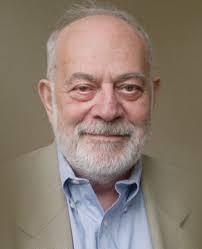
On Bullshit is actually a serious book, by a serious philosopher, Harry Frankfurt, published in 2005, by Princeton University Press, no less. Or at least it purports to be a serious book. Maybe Frankfurt is just bullshitting us.
It’s only 67 pages. Unusually small pages. With unusually wide margins. And large type. And space between each line. So it’s hardly even a throat-clearing.
But I thought it worth a read, after what can only be described as a bullshit presidency. Well, not only. But everything about that man was bullshit. Everything. How did millions fall for it?
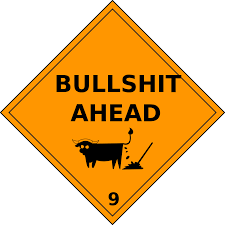
Naturally enough, Frankfurt starts with a definition. Taken from a 1985 book by Max Black, The Prevalence of Humbug. That’s an archaic word, perhaps not exactly synonymous with bullshit. Black’s definition: “deceptive misrepresentation, short of lying, especially by pretentious word or deed, of somebody’s own thoughts, feelings, or attitudes.” Frankfurt proceeds to didactically unpack this definition. The “short of lying” bit is problematic, when falsity is really of the essence here. And while pretentiousness does tend to go with the territory, it’s not of the essence.
Then there’s the “thoughts, feelings, attitudes” bit. Thus, perpetrators would be misrepresenting themselves. Frankfurt comments that any lie would seem to misrepresent the bullshitter’s state of mind, and he goes on to pedantically parse this concept. And it’s often true that the real motive is not so much to convince hearers of the facts being asserted as to convey something they want the hearers to believe about the bullshitters themselves.
But after devoting many of those 67 tiny pages to Black’s definition, Frankfurt concludes it’s “significantly off the mark[!]”
He deems the “shit” part of the word important, saying it refers to something not carefully crafted but “merely emitted, or dumped.” And yet sometimes bullshit is crafted carefully indeed. In advertising for example, which Frankfurt mentions. One could also mention all the efforts to concoct 60 lawsuits, and even a feature film, to advance the 2020 “stolen election” bullshit.
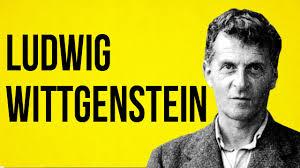
Frankfurt inexplicably devotes much space to an incident where a hospitalized friend of Wittgenstein said she felt like a dog that’s been run over, and Wittgenstein replied that she didn’t know how a run-over dog feels. Thus notionally accusing her of bullshit. Frankfurt’s analysis considers that Wittgenstein might merely have been joking, but not the alternative hypothesis that he was being a pedantic ass. And Frankfurt’s exegesis of the woman’s utterance glides past the obvious fact that it was merely a simile.
Next comes an equally pointless disquisition on the term “bull session,” whose purpose he says is not actually “to communicate beliefs.” Likewise “shooting the bull.” He also discusses the plain word “bull” as meaning “hot air,” connoting empty speech. (But why “hot?”) Then he says similarities between hot air and excrement make the former “an especially suitable equivalent for bullshit.”
Excrement is further characterized as “matter from which everything nutritive has been removed” (but ask a dung beetle!) and as a representation of death, perhaps explaining our revulsion. Or so he says.
Then he discusses bullshit vis-a-vis bluffing, leading him to assert “the essence of bullshit is not that it is false but that it is phony.” (His emphasis) And Frankfurt quotes a fictional character advising, “Never tell a lie when you can bullshit your way through.” An important difference, Frankfurt thinks, because people react less strongly against (mere) bullshitting than outright lies. But he demurs at trying to explain why.
Whereas lying “is an act with a sharp focus,” to “bullshit one’s way through” bespeaks an ongoing enterprise. Hence “the bullshit artist.” This leads Frankfurt to posit that bullshit really misrepresents not specific facts nor the perpetrator’s beliefs concerning them, so much as misrepresenting “what he is up to.” Hiding “that the truth values of his statements are of no central interest to him.”
Frankfurt thusly goes on to distinguish the bullshitter from both the honest person and the liar. The bullshitter “does not care whether the things he says describe reality correctly. He just picks them out, or makes them up, to suit his purpose.” Which makes bullshit “a greater enemy of the truth than lies are.”
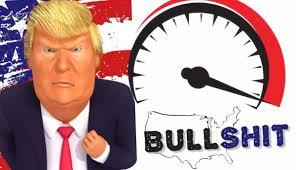
All fitting you-know-who to a “T.”
Oxford Philosopher G.A. Cohen has observed that Frankfurt omits a big category of bullshit — in academic discourse (or what passes for discourse), embodying not indifference to truth so much as indifference to meaning. Frankfurt also glaringly omits any word about religion.
He does finally address the question of why there’s been (excuse my lingo) a shitstorm of bullshit. Though since he wrote pre-Trump and even pre-smartphone, one could say, “You ain’t seen nothin’ yet.” Anyhow, he says bullshit is unavoidable whenever someone must speak without knowing what they’re talking about.
He also cites “modernist” doctrines (“post-modernism” actually) denying that we have any reliable access to objective reality. That’s the academic “discourse” Cohen was talking about.
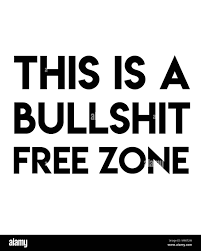
And though Frankfurt doesn’t tackle the deep question of what is truth, he suggests people elide that issue by striving instead to being true to themselves. But he ends by saying one’s own truth is actually the hardest thing for a person to know: “sincerity itself is bullshit.”
It’s been said that if you can fake sincerity, you’ve got it made.
